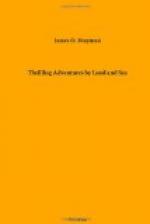We followed up the banks of the river for several days, with the usual allowance of sport. On the 16th we came suddenly upon an immense old bull muchocho rolling in mud. He sprang to his feet immediately he saw me, and, charging up the bank, so frightened our horses, that before I could get my rifle from my after-rider he was past us. I then gave him chase, and, after a hard gallop of about a mile, sprang from my horse and gave him a good shot behind the shoulder. At this moment a cow rhinoceros of the same species, with her calf, charged out of some wait-a-bit thorn cover, and stood right in my path. Observing that she carried an unusually long horn, I turned my attention from the bull to her, and, after a very long and severe chase, dropped her at the sixth shot. I carried one of my rifles, which gave me much trouble, that not being the tool required for this sort of work, where quick loading is indispensable.
After breakfast I sent men to cut off the head of this rhinoceros, and proceeded with Ruyter to take up the spoor of the bull wounded in the morning. We found that he was very severely hit, and having followed the spoor for about a mile through very dense thorn cover, he suddenly rustled out of the bushes close ahead of us, accompanied by a whole host of rhinoceros birds. I mounted my horse and gave him chase, and in a few minutes he had received four severe shots. I managed to turn his course toward camp, when I ceased firing, as he seemed to be nearly done up, and Ruyter and I rode slowly behind, occasionally shouting to guide his course. Presently, however, Chukuroo ceased taking any notice of us, and held leisurely on for the river, into a shallow part of which he walked, and, after panting there and turning about for a quarter of an hour, he fell over and expired. This was a remarkably fine old bull, and from his dentition it was not improbable that a hundred summers had seen him roaming a peaceful denizen of the forests and open glades along the fair banks of the secluded Mariqua.
During our march, on the 19th, we had to cross a range of very rocky hills, covered with large loose stones, and all hands were required to be actively employed for about an hour, in clearing them out of the way, to permit the wagons to pass. The work went on fast and furious, and the quantity of stones cleared was immense. At length we reached the spot where we were obliged to bid adieu to the Mariqua, and hold a westerly course across the country for Sicheley. At sundown we halted under a lofty mountain, the highest in the district, called “Lynchie a Cheny,” or the Monkey’s Mountain.
Next day, at an early hour, I rode out with Ruyter to hunt, my camp being entirely without flesh, and we having been rationed upon very tough old rhinoceros for several days past. It was a cloudy morning, and soon after starting, it came on to rain heavily. I, however, held on, skirting a fine, well-wooded range of mountains, and after riding several miles I shot a zebra. Having covered the carcass well over with branches to protect it from the vultures, I returned to camp, and, inspanning my wagons, took it up on the march. We continued trekking on until sundown, when we started an immense herd of buffaloes, into which I stalked, and shot a huge old bull.




